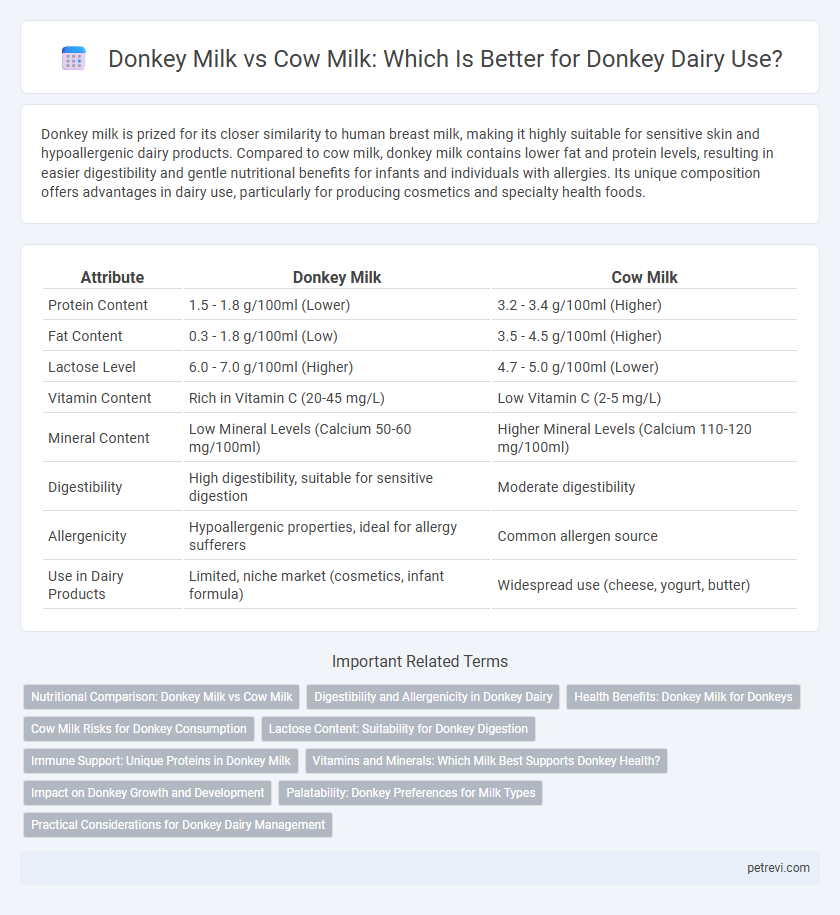Donkey milk is prized for its closer similarity to human breast milk, making it highly suitable for sensitive skin and hypoallergenic dairy products. Compared to cow milk, donkey milk contains lower fat and protein levels, resulting in easier digestibility and gentle nutritional benefits for infants and individuals with allergies. Its unique composition offers advantages in dairy use, particularly for producing cosmetics and specialty health foods.
Table of Comparison
| Attribute | Donkey Milk | Cow Milk |
|---|---|---|
| Protein Content | 1.5 - 1.8 g/100ml (Lower) | 3.2 - 3.4 g/100ml (Higher) |
| Fat Content | 0.3 - 1.8 g/100ml (Low) | 3.5 - 4.5 g/100ml (Higher) |
| Lactose Level | 6.0 - 7.0 g/100ml (Higher) | 4.7 - 5.0 g/100ml (Lower) |
| Vitamin Content | Rich in Vitamin C (20-45 mg/L) | Low Vitamin C (2-5 mg/L) |
| Mineral Content | Low Mineral Levels (Calcium 50-60 mg/100ml) | Higher Mineral Levels (Calcium 110-120 mg/100ml) |
| Digestibility | High digestibility, suitable for sensitive digestion | Moderate digestibility |
| Allergenicity | Hypoallergenic properties, ideal for allergy sufferers | Common allergen source |
| Use in Dairy Products | Limited, niche market (cosmetics, infant formula) | Widespread use (cheese, yogurt, butter) |
Nutritional Comparison: Donkey Milk vs Cow Milk
Donkey milk contains lower fat and protein levels but higher lactose compared to cow milk, making it closer to human breast milk in composition. Rich in vitamins A, B complex, C, and E, donkey milk supports skin health and immune function, whereas cow milk is higher in calcium and saturated fats. The unique fatty acid profile and bioactive enzymes in donkey milk offer probiotic benefits and improved digestibility, ideal for sensitive diets in donkey dairy production.
Digestibility and Allergenicity in Donkey Dairy
Donkey milk exhibits superior digestibility compared to cow milk due to its closer protein composition to human breast milk, making it gentle on the digestive system, especially for infants and people with sensitive stomachs. Its low casein content and high lactose levels reduce allergenicity, offering a hypoallergenic alternative in donkey dairy products. The unique bioactive compounds in donkey milk further enhance its suitability for individuals with cow milk protein allergies, promoting better tolerance and nutritional benefits.
Health Benefits: Donkey Milk for Donkeys
Donkey milk offers unique health benefits for donkeys, containing lower fat and higher lactose levels compared to cow milk, which supports improved digestion and hydration in donkeys. Rich in vitamins A, B12, and D, along with immunoglobulins, donkey milk strengthens the immune system and promotes skin health. Its hypoallergenic properties make it an ideal dietary option for donkeys with sensitivities to cow milk proteins.
Cow Milk Risks for Donkey Consumption
Cow milk contains higher lactose levels and different protein structures that can cause digestive issues such as diarrhea and colic in donkeys. The mineral composition in cow milk, particularly elevated calcium and phosphorus, may disrupt donkeys' calcium-phosphorus balance and affect bone health. Pathogens and allergens present in cow milk pose risks of immune reactions and infections, making it less suitable for donkey dairy use compared to donkey milk.
Lactose Content: Suitability for Donkey Digestion
Donkey milk contains significantly lower lactose levels, around 4.8%, compared to cow milk's 4.7% to 5%, making it easier for donkeys to digest and reducing the risk of lactose intolerance. The lactose in donkey milk closely resembles human milk, enhancing its digestibility and suitability for young or sensitive donkeys. This low lactose content supports better nutrient absorption and minimizes gastrointestinal discomfort in donkey dairy systems.
Immune Support: Unique Proteins in Donkey Milk
Donkey milk contains lysozyme and lactoferrin, unique proteins known for their strong antimicrobial and immune-supportive properties, unlike cow milk which has lower concentrations of these proteins. These bioactive components in donkey milk help enhance immune function and provide natural protection against infections. Donkey milk's immune-enhancing profile makes it a superior choice for dairy use targeting health-conscious consumers seeking immune support benefits.
Vitamins and Minerals: Which Milk Best Supports Donkey Health?
Donkey milk contains higher levels of vitamin C and calcium compared to cow milk, making it beneficial for supporting immune function and bone health in donkeys. Its lower fat content and rich profile of essential vitamins such as B-complex and minerals like potassium enhance digestive health and overall vitality in donkey dairy use. Cow milk, although higher in proteins, lacks the specific vitamins and minerals that align closely with donkey nutritional needs, positioning donkey milk as the superior choice for promoting optimal health in these animals.
Impact on Donkey Growth and Development
Donkey milk contains higher levels of essential fatty acids and bioactive proteins compared to cow milk, which supports optimal donkey growth and immune system development. Studies show that feeding donkey milk to foals enhances digestive health and nutrient absorption, promoting better weight gain and muscle formation. In contrast, cow milk's different protein composition may cause digestive disturbances and slower growth rates in donkeys, making donkey milk more suitable for dairy purposes involving donkeys.
Palatability: Donkey Preferences for Milk Types
Donkey milk exhibits a higher palatability for donkeys compared to cow milk due to its closer similarity to mare's milk in taste and composition. The natural sweetness and lower fat content of donkey milk align with donkeys' dietary preferences, enhancing their acceptance and consumption. Studies indicate that donkeys show a consistent preference for donkey milk over cow milk when offered both options.
Practical Considerations for Donkey Dairy Management
Donkey milk offers a unique composition with higher lactose and lower fat compared to cow milk, making it suitable for specialized dairy products but requiring adjustments in processing techniques. Donkey dairy management demands attention to milking frequency, as donkeys produce less milk volume and need gentle handling to prevent stress-induced drops in yield. Practical considerations include investing in specialized milking equipment and ensuring appropriate nutrition to maintain consistent milk quality and animal welfare.
Donkey Milk vs Cow Milk for Donkey Dairy Use Infographic

 petrevi.com
petrevi.com